Related Research Articles

Muhammad Zia-ul-Haq was a Pakistani military officer who served as the 6th president of Pakistan from 1978 until his death in 1988. He rose to prominence after leading a coup on 5 July 1977, which overthrew the democratically elected government of prime minister Zulfikar Ali Bhutto. Zia subsequently imposed martial law, suspended the constitution, and served as chief martial law administrator before assuming the presidency. Zia served as the 2nd chief of the Army Staff from 1976 to 1988, a position he later leveraged to execute a coup in 1977, which was the second coup in Pakistan's history of coups; the first occurred in 1958 under Ayub Khan.
Ghulam Ishaq Khan, commonly known by his initials GIK, was a Pakistani bureaucrat, politician and statesman who served as the seventh president of Pakistan from 1988 to 1993. He previously served as Chairman of the Senate from 1985 to 1988 under president Muhammad Zia-ul-Haq, and was sworn in shortly after Zia's death.

Jamaat-e-Islami Pakistan (JIP), is a Pakistani Islamist political party. It is the Pakistani successor to Jamaat-e-Islami, which was founded in colonial India in 1941. JIP is a "vanguard party", whose members are intended to be leaders spreading party beliefs and influence. Supporters not thought qualified to be members may become "affiliates", and beneath them are "sympathizers". The party leader is called an "ameer". Although, it does not have a large popular following, the party is quite influential and considered one of the major Islamic movements in Pakistan, along with Deobandi and Barelvi.
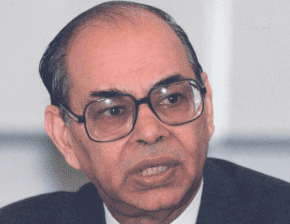
Mahbub ul-Haq was a Pakistani economist, international development theorist, and politician who served as the minister of Finance from 10 April 1985 to 28 January 1986, and again from June to December 1988 as a caretaker. Regarded as one of the greatest economists of his time, Haq devised the Human Development Index, widely used to gauge the development of nations.

Sheikh Anwarul Haq, was a Pakistani jurist and an academic who served as the 9th Chief Justice of Pakistan from 23 September 1977 until resigning on 25 March 1981. He signed the death warrant for former Prime Minister Zulfikar Ali Bhutto in a controversial murder case. Bhutto was executed on April 4, 1979.
General Sawar KhanNI(M) HI(M) SBt was a four-star general of the Pakistan Army who was the Governor of the largest province, Punjab and the Vice Chief of Army Staff during the era of General Muhammad Zia-ul-Haq, when Zia was simultaneously the Chief of Army Staff (Pakistan) and the President of Pakistan.
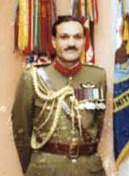
General Khalid Mahmud ArifNI(M) HI(M) SI(M) SBt LoM popularly known as K.M. Arif, was a senior officer of the Pakistan Army, serving as the vice-chief of army staff under President Zia-ul-Haq, who retained the command of the army since 1976.

Fazle HaqHI(M) SBt, was a three-star rank general in the Pakistan Army who became the martial law administrator (MLA) of Khyber-Pakhtunkhwa province of Pakistan during military dictatorial rule of Zia-ul-Haq. He was the "Corps-Commander" of the XI Corps, and commanded all the Pakistan Army assets assigned in the Khyber-Pakhtunkhwa Province. He commanded the combatant brigades, and supervised the clandestine covert network during the Soviet–Afghan War. He was one of the leading generals who led the Pakistan Combatant Forces during the Soviet–Afghan War. As military administrator, he had set up a network of training of the Afghan mujahideen. Under his command, the elements of Pakistan's administrative XI Corps participated in numerous operations against the Soviet Union.
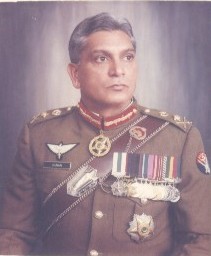
Shamim Alam Khan, NI(M) HI(M) SJ SBt LoH, was a four star-rank general in the Pakistan Army who served as the 7th Chairman Joint Chiefs of Staff Committee from 1991 until retiring in 1994.
Raja Muhammad Zafar-ul-Haq, is a Pakistani politician and lawyer, who served as senator from the Punjab, being elected on 12 March 2009. He had been the leader of the opposition in Senate from 2018 to 2021. He is serving as the Chairman of the Pakistan Muslim League (N), a centre-right party, since 20 February 2000.
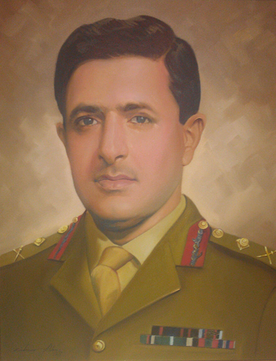
Tajammul Hussain Malik was a senior officer in the Pakistan Army and the former General Officer Commanding of the 23rd Division of Pakistan Army, retiring with the rank of major general. He was the commanding officer of Pakistani forces at the Battle of Hilli during the Indo-Pakistani war of 1971, and headed a failed coup attempt against the regime of Zia-ul-Haq in 1980 which resulted in a court-martial held by Judge Advocate General Branch of Pakistan Armed Forces headed by General Zia-ul-Haq.
Zahid Ali AkbarHI(M), SBt, PE, is a former engineering officer in the Pakistan Army Corps of Engineers, known for his role in Pakistan's acquisition of nuclear weapons, and directing the Engineering Research Laboratories (ERL), a top secret research facility developing the clandestine atom bomb project.
The 1977 Pakistani military coup was the second military coup in the history of Pakistan. Taking place on 5 July 1977, it was carried out by Muhammad Zia-ul-Haq, the chief of army staff, overthrowing the government of Prime Minister Zulfikar Ali Bhutto.
Ahmed Saeed Nagi, was a noted Pakistani painter artist. He was known as the 'official artist' of the Pakistan freedom movement.
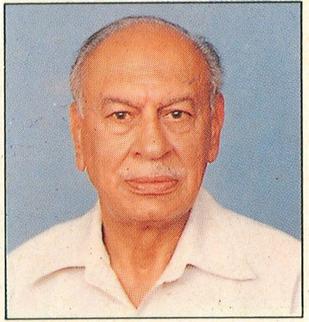
Agha Ali Ibrahim Akram better known as A. I. Akram, was a Pakistani former three-star rank general, military strategist, historian, diplomat, and one of Pakistan's most influential military historians. In the 1980s, Akram was a well-known defence expert and defence analyst. His most popular work was his biography of Khalid ibn al-Walid, The Sword of Allah, which he published while serving in the Pakistan Army. For several years, it was compulsory reading in the Pakistan Army for admission into the Command and Staff College Quetta and has been on the leadership syllabus in the Malaysian Army. Akram was once seen as a close confidant and conceptual adviser of President Zia-ul-Haq.
Ghulam Jilani KhanHI(M) SBt was a senior general of the Pakistan Army who served as the 14th Governor of Punjab Province and 11th Defence Secretary of Pakistan in the military government of President General Zia-ul-Haq.

The 1988 Gilgit massacre was the state-sponsored mass killing of Shia civilians in the Gilgit District of Pakistan who revolted against military dictator Zia-ul-Haq's Sunni Islamist regime, responsible for vehement persecution of religious minorities as part of its Islamization program.
Sahibzada Muhammad Sadiq ur-Rashid Ibrahim Abbasi, also known as S.M. Abbasi, was a three star general in the Pakistani Army, Governor of Sindh and member of the Bahawalpur royal family.

Air Marshal Inamul Haque KhanHJ HI(M) SI(M) was a three-star air officer in the Pakistan Air Force who is known for his role as AOC of the Dacca airbase of the Pakistan Air Force.
Saeed Ahmad Akbarabadi was an Indian Islamic scholar and an Urdu-language author who co-founded the Nadwatul Musannifeen. He served as the dean of the Faculty of Theology in Aligarh Muslim University.
References
- 1 2 Defence Journal (Pakistan) 2012, Volume 16, Issue 2, Pg.1
- ↑ Defence Journal (Pakistan) 2012, Volume 16, Issue 2, Pg.2
- ↑ Frontline (India) Volume 25; Issue 21, October 11–24, 2008 pg.1-2
- ↑ Aziz, Shaikh (23 March 2014). "A leaf from history: Zia's planned precision".
- ↑ "The Way It Was - 1". Archived from the original on 2016-03-04. Retrieved 2014-10-20.
- ↑ Amin, Agha Humayun. India Pakistan Wars-1947 to 1971-A Strategic and Operational Analysis. ISBN 9780557519842 – via Google Books.